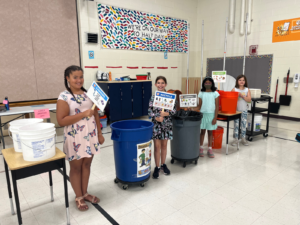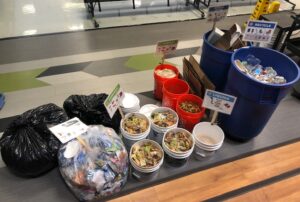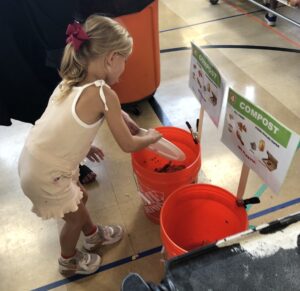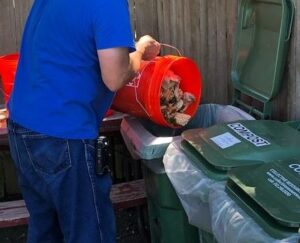 “We’re finally doing this!” was a sentiment shared by students and staff at all three schools in Lincolnshire-Prairie View School District 103 last month when the district launched commercial composting and recycling in their kitchens and lunchrooms. With logistical and educational support from SGA’s Zero Waste Schools team, a zero waste lunchroom program started at Half Day School, which serves Grades 3-5, on Sept. 7, followed by Daniel Wright Jr. High School on Sept. 12, and Laura B. Sprague School, which serves Grades PreK-2, on Sept. 16.
“We’re finally doing this!” was a sentiment shared by students and staff at all three schools in Lincolnshire-Prairie View School District 103 last month when the district launched commercial composting and recycling in their kitchens and lunchrooms. With logistical and educational support from SGA’s Zero Waste Schools team, a zero waste lunchroom program started at Half Day School, which serves Grades 3-5, on Sept. 7, followed by Daniel Wright Jr. High School on Sept. 12, and Laura B. Sprague School, which serves Grades PreK-2, on Sept. 16.
The initiative, spearheaded by D103 parent and Go Green Vernon Hills-Lincolnshire co-founder Seema Keshav, began before the pandemic, but efforts were stalled due to COVID safety protocols. “I wanted to start this program in our schools because reducing food waste and composting is one of the most effective ways to make a difference to climate change. Composting is a great way of getting our children involved in climate action and our hope is that this will sow the seed for other ways in which we can be more sustainable,” said Keshav. District leadership decided they were ready to roll out the Zero Waste Schools program at the beginning of this school year. Additional project partners include Quest Food Management Services, the Solid Waste Agency of Lake County, and Collective Resource Compost.
 Instead of sending all of their food scraps, trays, milk cartons, and other recyclables to the landfill, students now use sorting stations to separate out liquids, recycling, landfill, and compostables. On the first day of the program at each school, the schools diverted a combined total of 440 lbs, roughly 87%, of materials from the landfills. Now all students across the district have the same opportunity to take climate action every day. Regarding her PreK-2 students, Sprague principal Ann Hofmeier shared, “They might need help with the process, but their hearts are putting in the effort!”
Instead of sending all of their food scraps, trays, milk cartons, and other recyclables to the landfill, students now use sorting stations to separate out liquids, recycling, landfill, and compostables. On the first day of the program at each school, the schools diverted a combined total of 440 lbs, roughly 87%, of materials from the landfills. Now all students across the district have the same opportunity to take climate action every day. Regarding her PreK-2 students, Sprague principal Ann Hofmeier shared, “They might need help with the process, but their hearts are putting in the effort!”
Prior to the launch, D103 schools had already begun to demonstrate their waste-conscious mindsets by implementing practices such as using napkin and utensil dispensers to allow students to take only the materials they need. Schools also provide fresh fruits and vegetables at salad bars and serve food directly on compostable trays, both of which eliminate the need for unnecessary packaging.
 The three zero waste launches went smoothly as a result of the enthusiasm and preparedness of the school leadership, staff, and students. All students watched SGA’s 15-minute education video before launch day, and staff made lunchtime announcements about the importance of sorting waste and the impact it has on the planet. The students were also reminded that it’s best to not have to use the sorting stations at all– reducing waste, not just diverting it, is the ultimate goal. “This helps them understand the goal is Zero Waste, not just to recycle,” said Principal Hofmeier. Students with lunches from home are advised to take their uneaten food home so the caregivers packing their lunch can see what was eaten and adjust what they pack to prevent food waste.
The three zero waste launches went smoothly as a result of the enthusiasm and preparedness of the school leadership, staff, and students. All students watched SGA’s 15-minute education video before launch day, and staff made lunchtime announcements about the importance of sorting waste and the impact it has on the planet. The students were also reminded that it’s best to not have to use the sorting stations at all– reducing waste, not just diverting it, is the ultimate goal. “This helps them understand the goal is Zero Waste, not just to recycle,” said Principal Hofmeier. Students with lunches from home are advised to take their uneaten food home so the caregivers packing their lunch can see what was eaten and adjust what they pack to prevent food waste.
Going district-wide with the program has given D103 the opportunity to streamline standard operating procedures for waste reduction across the district. Collective Resource Compost provides the commercial composting hauling service for the district, and Republic Services provides recycling and trash hauling service.

A big thank you to all D103 staff and students, Quest Food Management Services, Go Green Vernon Hills-Lincolnshire, the Solid Waste Agency of Lake County, and Collective Resource Compost for their wonderful partnership on this project. We look forward to seeing what’s next on D103’s zero waste journey!
